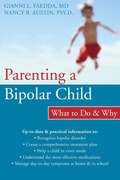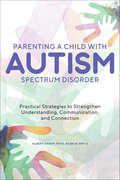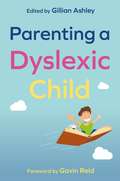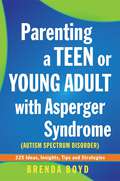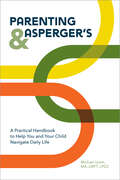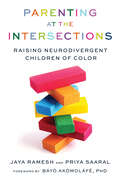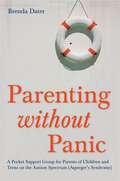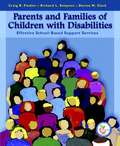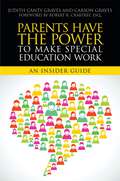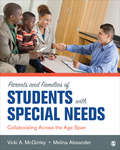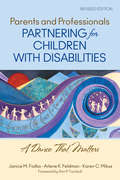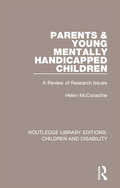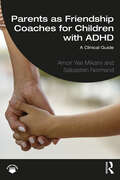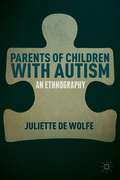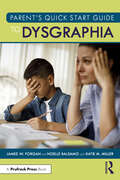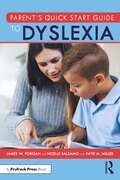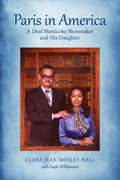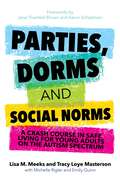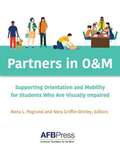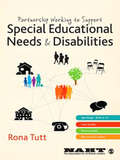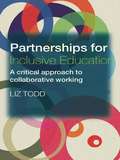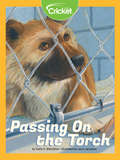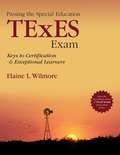- Table View
- List View
Parenting a Bipolar Child: What To Do And Why
by Gianni Faedda Nancy AustinTwo preeminent researchers and clinicians specializing in the treatment of child-onset bipolar disorder offer the first and only step-by-step guide for parents, a comprehensive approach to helping a child with bipolar disorder by integrating professional medical treatment with behavior regulation, problem solving, positive reinforcement, and limit setting techniques.
Parenting a Child with Autism Spectrum Disorder: Practical Strategies to Strengthen Understanding, Communication, and Connection
by Albert KnappPractical and compassionate strategies to help your child with autism spectrum disorder thriveGet the guidance you need to meet the challenges of raising an exceptional child. Parenting a Child with Autism Spectrum Disorder offers several approaches to help you effectively and respectfully manage everyday situations.Cut down on stress with practical advice drawn from clinical knowledge. Whether building a personal support network, creating safe environments, or navigating your child's relationship with others, you'll discover a variety of ways to set your child and yourself up for success in Parenting a Child with Autism Spectrum Disorder.Parenting a Child with Autism Spectrum Disorder includes:Easy-to-use advice—Find out how to help your child deal with a variety of situations, including home life, family outings, and educational opportunities.Real-life case studies—Gain insight into the use of this book's strategies with the help of examples drawn from real-life case studies.Advocacy and communication tips—Learn ways to better communicate with your child as well as advocate for their unique needs.Get a helping hand in finding the best ways to support your child with autism spectrum disorder.
Parenting a Dyslexic Child
by Helen Ross Lindsay Peer Pennie Aston Adam Gordon Katrina CochraneDrawing on the expert knowledge and research gathered by the British Dyslexia Association, this is a complete guide to parenting a child with dyslexia. Covering assessment, diagnosis, home and school support, emotional development and more, this empowering book has everything you need to help your child reach their full potential.With accessible guidance on reading, writing, spelling, organisation and study skills, this book will also help you to build self-belief in your child whilst ensuring that you care for yourself along the way. This book provides clear information on how dyslexia affects children and families at all stages of life, with insights on communicating with schools and ensuring the best support in all environments.
Parenting a Teen or Young Adult with Asperger Syndrome (Autism Spectrum Disorder): 325 Ideas, Insights, Tips and Strategies
by Brenda Boyd325 astute and practical ideas, insights, tips and strategies address the complex issues parents face during this crucial period of transition for their child with Asperger Syndrome (Autism Spectrum Disorder). The practical, bite-size suggestions focus on the vital importance of developing and nurturing an open and healthy relationship with your son or daughter. The easy-to-navigate format will suit busy parents wanting to locate advice to suit their particular needs. All the suggestions are designed to foster understanding and acceptance between family members and help the AS young person with common problem areas such as social vulnerability and peer relationships, self-esteem, anxiety and coping with change. This will be an invaluable companion for parents, carers and family members of an adolescent or young adult with AS.
Parenting and Asperger's: A Practical Handbook To Help You and Your Child Navigate Daily Life
by Michael UramEveryday parenting techniques to support kids ages 6 to 16 with Asperger's Raising a child with Asperger's can be both exciting and challenging. This book equips you with the confidence and tools to help them better communicate, understand social cues, and adapt to changes. You'll learn how Asperger's fits into the Autism spectrum, even though it's no longer a formal diagnosis, and find evidence-based strategies you can use at home, school, and beyond to make it easier for kids to succeed. Important first steps—Learn about the process of getting a diagnosis, and explore different methods of therapy, like Applied Behavior Analysis and Cognitive Behavioral Therapy. Helpful and realistic strategies—Find techniques to help kindergarteners and high schoolers alike navigate tasks such as leaving on time, practicing good hygiene, attending special events, and more. Resources for parents—Determine the best ways to advocate for your child at school, connect with other parents in the same situation, and balance your own needs as well as the needs of the rest of your family. Discover actionable, expert advice for helping your child thrive.
Parenting at the Intersections: Raising Neurodivergent Children of Color
by Bayo Akomolafe Jaya Ramesh Priya Saaral"This is an invaluable, nuanced, and deeply needed guide to parenting diverse children as we move, together, toward a future in which all brains and bodies are supported—and belong." —Jessica McCabe, How to ADHDWhat if parenting were an act of social justice? In this part story-telling, part self-inquiry book, authors and therapists Jaya Ramesh and Priya Saaral situate parenting children of color with neurodivergence within the context of various interlocking systems of oppression including settler colonialism, White supremacy, ableism, and capitalism. These intersections engender isolation and loneliness. Using the voices of parents on the front lines and other experts, Parenting at the Intersections offer an invitation to parents to slow down and reflect on their own parenting journeys.When parents can be given space to listen to their own voices, to connect with their children, and find community with others, they can find the most radical ways to disrupt systems of oppression.
Parenting without Panic: A Pocket Support Group for Parents of Children and Teens on the Autism Spectrum (Asperger's Syndrome)
by Brenda DaterEver wish that parenting a child or teen on the autism spectrum came with instant access to a support group? Brenda Dater has provided parents with exactly that. In this book she draws on her extensive experience as a support group leader and parent of a child on the spectrum to offer trusted advice and tried-and-tested solutions to parents' top concerns, all in an accessible and easy-to-read format. Filled with the voices of other parents in the same situation, the book covers everything from the first steps to take after diagnosis, to advocacy and disclosure, behavior, building independence and resilience, making friends, holidays and vacations, homework, supporting siblings, how to garner support from extended family and friends, and how parents can look after their own wellbeing. This book extends the vital lifeline of a support group to parents of children and teens on the autism spectrum everywhere.
Parents And Families Of Children With Disabilities: Effective School-Based Support Services
by Richard L. Simpson Denise M. Clark Craig R. Fiedler Patricia J. Fewell William J. GibbsParents and Families of Children with Disabilities: Providing Effective School Based Support Services provides teachers and paraprofessionals with necessary motivation, research-based practices, skills, and resources to collaborate effectively wiith familes to develop family-centered schools. The book challenges educators to rethink the traditional roles and responsibilities of public schools, training teachers and paraprofessionals how to achieve effective stress management, child advocacy, and transition planning, as well as how to provide academic intervention for the families of children with disabilities and the diverse communities that surround them. General K-12 inservice teachers, paraprofessionals, and parents.
Parents Have the Power to Make Special Education Work: An Insider Guide
by Carson Graves Judith Canty GravesWritten by parents who have been through the US special education system, this book cuts through the jargon to provide other parents with a no-nonsense road map full of valuable first-hand insights and tried-and-tested advice. The authors clearly describe: · the special education process, including the school hierarchies parents are likely to encounter and etiquette to be aware of when dealing with school personnel · the information parents should expect to see in school evaluations and Individualized Education Programs (IEPs), and what to do when this information is missing or insufficient · problems parents may encounter when the needs of the school conflict with the needs of a child, including how to deal with such situations and when to seek legal advice · the importance of organizing special education documentation and establishing a 'paper trail', and how to begin this process · why transition planning is so important, and transition services parents may want to consider for their child. Demonstrating that parents really do have the power to make special education work for their child, this empowering guide is essential reading for parents of children with disabilities who are new to the special education system in the US, as well as those who feel frustrated with the system.
Parents and Families of Students With Special Needs: Collaborating Across the Age Span
by Dr Vicki A. McGinley Dr Melina AlexanderParents and Families of Students With Special Needs: Collaborating Across the Age Span teaches students the skills they need to effectively collaborate with parents and families to ensure a child's success in the classroom. Authors Vicki A. McGinley and Melina Alexander’s text takes a lifespan approach with a special emphasis on the critical transition points in a child’s life. Information is provided on what can be seen at each stage of an individual with disabilities’ development, and addresses concerns and needs that families may have during these unique phases of growth. Chapters written by professors and professionals who are also parents of students with special needs bring a diverse range of voices into the narrative. The authors provide an in-depth discussion of how parents and families are affected by particular disabilities, family system theory, the laws that affect individuals with disabilities, and assessments for individuals with disabilities.
Parents and Families of Students With Special Needs: Collaborating Across the Age Span
by Dr Vicki A. McGinley Dr Melina AlexanderParents and Families of Students With Special Needs: Collaborating Across the Age Span teaches students the skills they need to effectively collaborate with parents and families to ensure a child's success in the classroom. Authors Vicki A. McGinley and Melina Alexander’s text takes a lifespan approach with a special emphasis on the critical transition points in a child’s life. Information is provided on what can be seen at each stage of an individual with disabilities’ development, and addresses concerns and needs that families may have during these unique phases of growth. Chapters written by professors and professionals who are also parents of students with special needs bring a diverse range of voices into the narrative. The authors provide an in-depth discussion of how parents and families are affected by particular disabilities, family system theory, the laws that affect individuals with disabilities, and assessments for individuals with disabilities.
Parents and Professionals Partnering for Children With Disabilities: A Dance That Matters
by Janice M. Fialka Arlene K. Feldman Karen C. MikusCultivate effective partnerships between parents and professionals Written from both the parent’s and the professional’s points of view, this book draws upon the metaphor of dance to highlight the essential partnership between teachers, administrators, support staff, and parents of children with disabilities. Rich with humor and heart, the book offers helpful steps for self reflection, personnel preparation, and parent-professional training. Key features include: Practical insights and evidence-based approaches to forming partnerships Easy-to-read, non-technical language that speaks to both the heart and the mind Sample letters, conversations, and other forms of communication between professionals and parents Effective ways to handle difficult situations
Parents and Young Mentally Handicapped Children: A Review of Research Issues (Routledge Library Editions: Children and Disability #10)
by Helen McConachieFirst published in 1986, this book reviews research on the role parents play in fostering the early development of children with mental handicaps. Professionals and parents must work together to give such children the chance of living as ordinary lives as possible and here, the author develops a broadly-based conceptual framework for the involvement of parents as teachers of their young handicapped children. McConachie identifies characteristics of parents which seem of particular relevance to the design and success of intervention programmes. Although written in the 1980s, this book discusses topics that are still important today.
Parents as Friendship Coaches for Children with ADHD: A Clinical Guide
by Amori Yee Mikami Sébastien NormandThis book introduces Parental Friendship Coaching (PFC), an intervention that parents can use to support peer relationships in their elementary school-aged children with ADHD. In the PFC program, clinicians work with parents to coach their children with ADHD in friendship behaviors that help develop and maintain high-quality relationships. Featuring 10 research-based clinical sessions, the book provides detailed, step-by-step instructions for clinicians about intervention provision. Each session includes skills teaching devoted to supporting children’s peer relationships, activities to practice the skills in session, problem-solving about difficulties carrying out the skills, and homework to try the skills at home. This book also includes handouts for parents and clinicians, tips for clinicians about addressing common parent difficulties, and suggestions for progress monitoring. Intended for mental health professionals working with families of children with ADHD and peer problems, this book will aid clinicians in educating parents on how to support their children’s friendship development.
Parents of Children with Autism
by Juliette De WolfeIn a readable and highly accessible ethnographic account that is shaped by the stories of families and the voices of parents, De Wolfe examines how parents of children with autism navigate the educational and medical systems, understand their own and their children's bodies, and support and educate one another.
Parent’s Quick Start Guide to Dysgraphia
by James W. Forgan Noelle BalsamoParent’s Quick Start Guide to Dysgraphia provides parents and caregivers with an immediate overview of dysgraphia and steps they can take to support and encourage their child. Each chapter is packed with detailed and helpful information, covering identification, strategies for improvement, advocating for your child, and maintaining your child’s self-esteem. Summary and resource sections at the end of each chapter give quick guidance to busy readers. Topics include a wealth of research-backed activities, strategies for improving penmanship, making writing fun, technological assistance, and more. Offering straightforward, easy to understand, and evidence-based information, this book is a go-to resource for caregivers parenting a child with dysgraphia.
Parent’s Quick Start Guide to Dyslexia
by James W. Forgan Noelle BalsamoParent’s Quick Start Guide to Dyslexia provides parents and caregivers with an immediate overview of dyslexia and steps they can take to support and encourage their child. Each chapter is packed with detailed and helpful information, covering identification, public schools versus private settings, and how (and when) to seek professional help. Summary and resource sections at the end of each chapter give quick guidance to busy readers. Topics include a wealth of research-backed activities, nurturing talent and creativity, motivating your child to read, and more. Offering straightforward, easy to understand, and evidence-based information, this book is a go-to resource for caregivers parenting a child with dyslexia.
Paris in America: A Deaf Nanticoke Shoemaker and His Daughter
by Clara Jean Hall Gayle WilliamsonClara Jean Mosley Hall has inhabited various cultural worlds in her life: Native American, African American, Deaf, and hearing. The hearing daughter of a Deaf Nanticoke Indian, who grew up in Dover, Delaware’s black community in the 1950s and 60s, Hall describes the intersections of these identities in Paris in America. By sharing her father’s experiences and relating her own struggles and successes, Hall honors her father’s legacy of hard work and perseverance and reveals the complexities of her own unique background. Hall was abandoned by her Deaf African-American mother at a young age and forged a close bond with her father, James Paris Mosley, who communicated with her in American Sign Language. Although his family was American Indian, they—like many other Nanticoke Indians of that region—had assimilated over time into Dover’s black community. Hall vividly recounts the social and cultural elements that shaped her, from Jim Crow to the forced integration of public schools, to JFK and Motown. As a CODA (Child of Deaf Adults) in a time when no accessibility or interpreting services were available, she was her father’s sole means of communication with the hearing world, a heavy responsibility for a child. After her turbulent teenage years, and with the encouragement of her future husband, she attended college and discovered that her skills as a fluent ASL user were a valuable asset in the field of education. Hall went on to become a college professor, mentor, philanthropist, and advocate for Deaf students from diverse backgrounds. Her memoir is a celebration of her family, her faith, her journey, and her heritage.
Participant Handbook - Data Entry Operator (Divyangjan)
by Skill Council for Persons with DisabilityThe Participant Handbook - Data Entry Operator (Divyangjan) is a comprehensive guide designed to provide skill-based training for individuals with disabilities, focusing on the role of Domestic Data Entry Operators within the IT-ITeS sector. It aligns with the National Occupational Standards and offers structured learning through a modular approach. Covering essential aspects like data entry processes, software requirements, troubleshooting, and employability skills, the handbook emphasizes accuracy, professionalism, and error mitigation in data handling. It also incorporates guidelines for leveraging automation technologies such as OCR and AI to enhance efficiency, while addressing the unique needs of participants through tailored content for various disabilities.
Parties, Dorms and Social Norms: A Crash Course in Safe Living for Young Adults on the Autism Spectrum
by Lisa M. Meeks Emily Quinn Tracy Loye Masterson Amy Rutherford Aaron Schatzman Jane Thierfeld-Brown Michelle RiglerThe late teens and twenties are exciting times, but filled with potential pitfalls as young people navigate the transition into independent adult life. This handbook is filled with the information that young people with ASD say they want (and need) to know about alcohol and drugs, social media and online safety, relationship types and boundaries, safe sex, stress and emotional health, and independent living. It includes real life examples, coping strategies and practical tips to help young adults with ASD stay safe while living life to the full. Informal and frank, this will be a go-to guide for young people on the autism spectrum.
Partners in O&M: Supporting Orientation and Mobility for Students Who Are Visually Impaired
by Rona L. Pogrund Nora Griffin-ShirleyPartners in O&M: Supporting Orientation and Mobility for Students Who Are Visually Impaired is a comprehensive text that serves as an introduction to the field of O&M, with a focus on professionals who work in collaboration with O&M specialists to support O&M instruction for students who are blind or visually impaired.
Partnership Working to Support Special Educational Needs & Disabilities
by Dr Rona TuttIn order to achieve the best outcomes for all children and young people, schools must work in partnership with students, parents, other professionals and the wider community. In this changing landscape of education, the notion of the traditional school is fast disappearing. This book looks at what is possible in this exciting new world, and how some teachers and other professionals are putting into practice the best principles of multi-agency working. Finding innovative ways of supporting children and young people with special educational needs and disabilities (SEND) in this context is more important than ever, as children are being diagnosed with increasingly complex needs. Those working with children need to be aware of the fresh opportunities that are opening up and which can help every individual to maximise their full potential. This book examines how partnership working affects children with SEND by considering: - the diversity of additional needs; - the role of specialist schools that have an SEN specialism; - partnership working between mainstream and special schools; - partnership working with groups of schools, including those that are co-located or federated; - the growth of academies and trust schools; - schools and other services working together; - the work of extended schools and children's centres; - a wide range of other services for children, young people and families. Filled with case studies of effective practice from real schools and services, this book is a must-have for those looking at how to work together to achieve positive outcomes for all. Rona Tutt OBE is a Past President of the National Association of Head Teachers (NAHT) and works as a consultant, writer and researcher on all matters relating to education in general, and special educational needs and disabilities in particular.
Partnerships for Inclusive Education: A Critical Approach to Collaborative Working
by Liz ToddShortlisted for the NASEN/TES 2007 Book Award Increased partnership between professionals, particularly through the integration of services, indicates a major opportunity for child and parent participation, but one that seems in danger of being side-stepped. Drawing on substantial research evidence, this book looks at reasons for this situation; what is happening now, what developments and initiatives have been tried and what can be done to develop a culture of participation? Some of the main threats to participation are discussed in this book including: Has ‘partnership’ ever been? Who is excluded from 'partnership'? Which discourses have made participation illusive and what are the implications – theoretical and practical - for how we move forward? Partnerships for Inclusive Education includes a helpful framework map which guides critical thinking towards the development of a culture of collaboration and presents original and stimulating ideas to open up the complex processes that can frustrate participative practice. Combining socio-cultural ideas with post-structural thinking gives this book a strong yet accessible theoretical basis, making it a valuable resource to both an academic and a professional educational audience.
Passing On the Torch
by Claire H. BlatchfordWhen Ginger, a hearing-ear dog, begins to go deaf herself, her owner must find another dog to help them both. Her owner pays a visit to the pound and finds Leo! Will he be able to help them hear?
Passing the Special Education TExES Exam: Keys to Certification and Exceptional Learners
by Elaine L. WilmoreGain confidence, lower stress, and raise your TExES exam scores! In this artful guide, TExES test prep veteran Elaine Wilmore breaks down the EC-12 and Supplemental special education test so you can feel calm and confident on test day. Built on her successful test-prep training seminars, she shows how to think like the test was developed and covers: Each special education domain and competency Philosophies behind the test questions Teaching stories that improve answer recall Tips for analyzing test questions Ways to use key words and concepts to improve test results Techniques for in-state and out-of-state test takers
